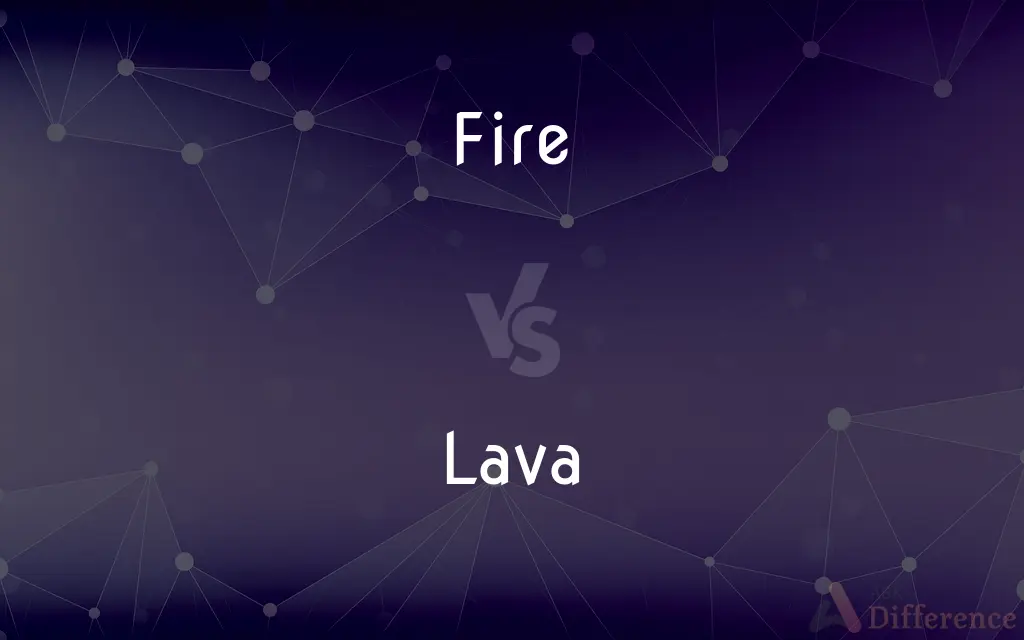Fire vs. Lava — What's the Difference?
Edited by Tayyaba Rehman — By Maham Liaqat — Updated on April 30, 2024
Fire is a rapid oxidation process producing heat and light, whereas lava is molten rock expelled by a volcano during an eruption.

Difference Between Fire and Lava
Table of Contents
ADVERTISEMENT
Key Differences
Fire is a chemical reaction known as combustion, involving fuel, heat, and oxygen, which results in the release of light and heat. Whereas lava is a physical manifestation of geothermal energy, consisting of molten rock that surfaces during volcanic activity. Both are natural phenomena but result from different processes.
Fire typically occurs at a much lower temperature range, burning at about 600°C to 1,200°C depending on the material and oxygen availability. On the other hand, lava flows at temperatures from approximately 700°C to 1,200°C, showcasing the intense heat generated beneath the Earth’s crust.
Fire emits light and heat, making it a crucial energy source for human use over millennia, for heating, cooking, and industrial processes. In contrast, lava, while also intensely hot, is primarily destructive when it interacts with human-made structures and natural landscapes, reshaping landforms and ecosystems.
The visibility of fire is marked by flames that can vary in color based on the substances being burned and the temperature of the fire. Whereas lava is typically red-hot in its most visible state, cooling to a blackish hue as it solidifies, with its flow patterns often visible on the landscape.
Fire can be quickly started and extinguished with proper tools and techniques, making it manageable under controlled conditions. Lava, however, once it begins to flow, is unstoppable until it cools and hardens, making management about containment and diversion rather than extinguishment.
ADVERTISEMENT
Comparison Chart
Nature
Chemical reaction (combustion)
Physical manifestation (molten rock)
Temperature Range
600°C to 1,200°C
700°C to 1,200°C
Utility
Energy source for heating and cooking
Reshapes landscapes, primarily destructive
Visibility & Color
Flames, varies with material & temperature
Red-hot, turns blackish as it cools
Management
Controllable and extinguishable
Unstoppable flow, managed by containment
Compare with Definitions
Fire
A rapid oxidation process producing heat and light.
The campfire provided warmth and light in the dark forest.
Lava
Cools and solidifies into rock.
The lava cooled rapidly, forming new rock formations.
Fire
Visible aspect of fire is flames.
The flames of the fire danced in the wind.
Lava
Molten rock expelled from a volcano.
The volcano erupted, spewing lava down its slopes.
Fire
Can be ignited from a small spark.
A single spark can ignite a massive fire under dry conditions.
Lava
Appears red-hot when expelled.
The lava glowed red-hot as it flowed into the sea.
Fire
Can be extinguished with water or fire extinguishers.
They extinguished the small fire with a handheld fire extinguisher.
Lava
Destructive to anything in its path.
The advancing lava destroyed homes and forests alike.
Fire
Used for energy and cooking.
Fire has been crucial for cooking food since ancient times.
Lava
Cannot be stopped until it cools.
The lava flow was unstoppable, altering the landscape permanently.
Fire
Fire is the rapid oxidation of a material in the exothermic chemical process of combustion, releasing heat, light, and various reaction products. Fire is hot because the conversion of the weak double bond in molecular oxygen, O2, to the stronger bonds in the combustion products carbon dioxide and water releases energy (418 kJ per 32 g of O2); the bond energies of the fuel play only a minor role here.
Lava
Lava is molten rock (magma) that has been expelled from the interior of a terrestrial planet (such as Earth) or a moon. Magma is generated by the internal heat of the planet or moon and it is erupted as lava at volcanoes or through fractures in the crust, usually at temperatures from 800 to 1,200 °C (1,470 to 2,190 °F).
Fire
A rapid, persistent chemical change that releases heat and light and is accompanied by flame, especially the exothermic oxidation of a combustible substance
Destruction by fire.
Lava
Molten rock that reaches the earth's surface through a volcano or fissure.
Fire
A specific instance of this change that destroys something
A house fire.
Lava
The rock formed by the cooling and solidifying of molten rock.
Fire
A burning fuel
A cooking fire.
Lava
The molten rock ejected by a volcano from its crater or fissured sides.
Fire
Burning intensity of feeling; ardor or enthusiasm
A musical performance that had fire.
Lava
Magma.
Fire
Luminosity or brilliance, as of a cut and polished gemstone.
Lava
A shade of red, named after the volcanic lava.
Fire
Liveliness and vivacity of imagination; brilliance
The fire of an artistic genius.
Lava
The melted rock ejected by a volcano from its top or fissured sides. It flows out in streams sometimes miles in length. It also issues from fissures in the earth's surface, and forms beds covering many square miles, as in the Northwestern United States.
Fire
A severe test; a trial or torment
Went through fire to become a leader.
Lava
Rock that in its molten form (as magma) issues from volcanos; lava is what magma is called when it reaches the surface
Fire
A fever or bodily inflammation
Tormented by the fire in an infected toe.
Fire
The discharge of firearms or artillery
Heard the fire of cannon.
Fire
The launching of a missile, rocket, or similar ballistic body.
Fire
Discharged bullets or other projectiles
Subjected enemy positions to heavy mortar fire.
Struck by rifle fire.
Fire
Intense, repeated attack or criticism
Answered the fire from her political critics.
Fire
To cause to burn; ignite or set fire to
Fired the enemy's encampment.
Fire
To illuminate or cause to resemble fire, as in color
The morning sun fired the tops of the trees.
Fire
To start (a fuel-burning engine or a vehicle with such an engine). Often used with up.
Fire
To start or tend a fire in
Fire a furnace.
Fire
To arouse the emotions of; make enthusiastic or ardent. Often used with up
Demonstrators who were fired up by their sense of injustice.
Fire
To inspire or arouse (an emotion or the imagination).
Fire
To bake or dry by heating, as in a kiln
Fire pottery.
Fire
To discharge (a firearm, for example).
Fire
To detonate (an explosive).
Fire
(Informal) To throw or propel with force and speed
Fire a ball at a batter.
Fire a puck at the goal.
Fire
To utter or direct with insistence
Fired questions at the senator.
Fire
(Games) To score (a number) in a game or contest
The golfer fired a 35 on the front nine.
Fire
To end the employment or service of; dismiss.
Fire
To become ignited; flame up
Wet kindling that just wouldn't fire.
Fire
To shoot a weapon
Aimed and fired at the target.
Fire
To detonate an explosive.
Fire
To ignite fuel; start
The engine fired right away.
Fire
To send out a projectile; discharge
The cannons fired for hours.
Fire
To propel or hurl a projectile
The pitcher wound up and fired.
Fire
(Physiology) To generate an electrical impulse. Used of a neuron.
Fire
To become yellowed or brown before reaching maturity, as grain.
Fire
(uncountable) A (usually self-sustaining) chemical reaction involving the bonding of oxygen with carbon or other fuel, with the production of heat and the presence of flame or smouldering.
Fire
(countable) An instance of this chemical reaction, especially when intentionally created and maintained in a specific location to a useful end (such as a campfire or a hearth fire).
We sat about the fire singing songs and telling tales.
Fire
(countable) The occurrence, often accidental, of fire in a certain place, causing damage and danger.
There was a fire at the school last night and the whole place burned down.
During hot and dry summers many fires in forests are caused by regardlessly discarded cigarette butts.
Fire
The aforementioned chemical reaction of burning, considered one of the Classical elements or basic elements of alchemy.
Fire
A heater or stove used in place of a real fire (such as an electric fire).
Fire
(countable) The elements necessary to start a fire.
The fire was laid and needed to be lit.
Fire
(countable) A planned bombardment by artillery or similar weapons, or the capability to deliver such.
We dominated the battlespace with our fires.
Fire
A barrage, volley
Fire
(rocketry) An instance of firing one or more rocket engines.
Static fire
Fire
Strength of passion, whether love or hate.
Fire
Liveliness of imagination or fancy; intellectual and moral enthusiasm.
Fire
Splendour; brilliancy; lustre; hence, a star.
Fire
A severe trial; anything inflaming or provoking.
Fire
Red coloration in a piece of opal.
Fire
(slang) Amazing; excellent.
That shit is fire, yo!
Fire
(transitive) To set (something, often a building) on fire.
Fire
(transitive) To heat as with fire, but without setting on fire, as ceramic, metal objects, etc.
If you fire the pottery at too high a temperature, it may crack.
They fire the wood to make it easier to put a point on the end.
Fire
(transitive) To drive away by setting a fire.
Fire
(transitive) To terminate the employment contract of (an employee), especially for cause (such as misconduct or poor performance).
Fire
To terminate a contract with a client; to drop a client.
Fire
(rocketry) To operate a rocket engine to produce thrust.
The RCS thrusters fired several times to stabilize the tumbling spacecraft.
Fire
To set off an explosive in a mine.
Fire
To shoot; to attempt to score a goal.
Fire
To cause an action potential in a cell.
When a neuron fires, it transmits information.
Fire
(transitive) To forcibly direct (something).
He answered the questions the reporters fired at him.
Fire
To initiate an event (by means of an event handler).
The event handler should only fire after all web page content has finished loading.
The queue fires a job whenever the thread pool is ready to handle it.
Fire
(transitive) To inflame; to irritate, as the passions.
To fire the soul with anger, pride, or revenge
Fire
To be irritated or inflamed with passion.
Fire
To animate; to give life or spirit to.
To fire the genius of a young man
Fire
To feed or serve the fire of.
To fire a boiler
Fire
(transitive) To light up as if by fire; to illuminate.
Fire
To cauterize.
Fire
To catch fire; to be kindled.
Fire
Command to shoot with firearms
Fire
The evolution of light and heat in the combustion of bodies; combustion; state of ignition.
Fire
Fuel in a state of combustion, as on a hearth, or in a stove or a furnace.
Fire
The burning of a house or town; a conflagration.
Fire
Anything which destroys or affects like fire.
Fire
Ardor of passion, whether love or hate; excessive warmth; consuming violence of temper.
He had fire in his temper.
Fire
Liveliness of imagination or fancy; intellectual and moral enthusiasm; capacity for ardor and zeal.
And bless their critic with a poet's fire.
Fire
Splendor; brilliancy; luster; hence, a star.
Stars, hide your fires.
As in a zodiacrepresenting the heavenly fires.
Fire
Torture by burning; severe trial or affliction.
Fire
The discharge of firearms; firing; as, the troops were exposed to a heavy fire.
Fire
To set on fire; to kindle; as, to fire a house or chimney; to fire a pile.
Fire
To subject to intense heat; to bake; to burn in a kiln; as, to fire pottery.
Fire
To inflame; to irritate, as the passions; as, to fire the soul with anger, pride, or revenge.
Love had fired my mind.
Fire
To animate; to give life or spirit to; as, to fire the genius of a young man.
Fire
To feed or serve the fire of; as, to fire a boiler.
Fire
To light up as if by fire; to illuminate.
[The sun] fires the proud tops of the eastern pines.
Fire
To cause to explode; as, to fire a torpedo; to disharge; as, to fire a rifle, pistol, or cannon; to fire cannon balls, rockets, etc.
Fire
To drive by fire.
Till my bad angel fire my good one out.
Fire
To cauterize.
Fire
To dismiss from employment, a post, or other job; to cause (a person) to cease being an employee; - of a person. The act of firing is usually performed by that person's supervisor or employer.
Fire
To take fire; to be kindled; to kindle.
Fire
To be irritated or inflamed with passion.
Fire
To discharge artillery or firearms; as, they fired on the town.to grow irritated or angry.
Fire
The event of something burning (often destructive);
They lost everything in the fire
Fire
The process of combustion of inflammable materials producing heat and light and (often) smoke;
Fire was one of our ancestors' first discoveries
Fire
The act of firing weapons or artillery at an enemy;
Hold your fire until you can see the whites of their eyes
They retreated in the face of withering enemy fire
Fire
A fireplace in which a fire is burning;
They sat by the fire and talked
Fire
Intense adverse criticism;
Clinton directed his fire at the Republican Party
The government has come under attack
Don't give me any flak
Fire
Feelings of great warmth and intensity;
He spoke with great ardor
Fire
Once thought to be one of four elements composing the universe (Empedocles)
Fire
A severe trial;
He went through fire and damnation
Fire
Start firing a weapon
Fire
Bake in a kiln so as to harden;
Fire pottery
Fire
Terminate the employment of;
The boss fired his secretary today
The company terminated 25% of its workers
Fire
Drive out or away by or as if by fire;
The soldiers were fired
Surrender fires the cold skepticism
Fire
Call forth (emotions, feelings, and responses);
Arouse pity
Raise a smile
Evoke sympathy
Fire
Destroy by fire;
They burned the house and his diaries
Fire
Provide with fuel;
Oil fires the furnace
Common Curiosities
What is fire?
Fire is a process of combustion where heat, light, and various reaction products are produced.
At what temperature does fire burn?
Fire can burn at temperatures from about 600°C to 1,200°C, depending on conditions.
At what temperature does lava flow?
Lava flows at temperatures ranging from about 700°C to 1,200°C.
What happens to lava when it cools?
When lava cools, it solidifies into rock, often altering landscapes permanently.
What is lava?
Lava is molten rock that emerges from the Earth during a volcanic eruption.
Can fire be used for industrial purposes?
Yes, fire is used extensively in industrial processes, including smelting and combustion engines.
How can lava be controlled?
Lava flows cannot be stopped; they can only be redirected or contained.
Is fire visible in all its stages?
Fire is visible during its active burning phase, characterized by flames.
How does lava affect the environment?
Lava can devastate local ecosystems, destroy structures, and reshape landforms.
How is fire started?
Fire can be started by applying a heat source to a fuel in the presence of oxygen.
What role does oxygen play in fire?
Oxygen is a critical component of combustion, required to sustain a fire.
What is the difference in the impact of fire and lava on human settlements?
Fire, while potentially destructive, can be controlled and extinguished, whereas lava destroys everything in its path without a means to stop it.
What safety measures are necessary for fire?
Fire safety measures include fire extinguishers, smoke detectors, and safe handling practices.
What are the uses of fire by humans?
Fire is used for heating, cooking, and in various crafting and industrial processes.
Can lava be predicted?
Volcanologists can often predict volcanic eruptions and lava flow paths using geological surveys and monitoring.
Share Your Discovery

Previous Comparison
Or vs. Er
Next Comparison
Impala vs. AntelopeAuthor Spotlight
Written by
Maham LiaqatEdited by
Tayyaba RehmanTayyaba Rehman is a distinguished writer, currently serving as a primary contributor to askdifference.com. As a researcher in semantics and etymology, Tayyaba's passion for the complexity of languages and their distinctions has found a perfect home on the platform. Tayyaba delves into the intricacies of language, distinguishing between commonly confused words and phrases, thereby providing clarity for readers worldwide.













































